No longer invisible: caregivers speak out
Posted on September 4, 2009, by mercedes, under Gender Masala, HIV/AIDS, culture, human rights, media, violence, women, men and more.
Guest blogger: Glenda Muzenda, Care Work Manager at Gender and Media Southern Africa (GEMSA)
I just attended the Grassroots Women’s International Academy on Home Based Care in Johannesburg, South Africa.
It was a mixed bag of fun meeting women from all walks and works of life from Kenya, Cameroon, Uganda, Malawi, Nigeria, Ethiopia, Rwanda, Zambia, Ghana, Namibia, Zimbabwe, and South Africa.
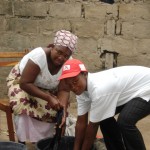
Caregiving in Mozambique. Photo: Janine Morna
The Huairou Commission and the Land Access Movement of South Africa brought us together to share experiences of home-based care.
It is fascinating how in Malawi the care givers alliance has moved forward. Victoria Kalomba, of the Malawi Group of Women Living with HIV and AIDS told us that the ministry of health and social development had spearheaded a campaign to raise awareness about people infected and affected by HIV.
The process had the ministry informing the support groups of individuals who had tested positive after visiting clinics so they could be reached and helped.
I am worried about this way of outing positive people even in the aim of mobilizing support groups. I feel that it is a human right violation to have to give information of someone’s HIV status.
109 Comments
Timeless wisdom: traditional healing in Africa
Posted on August 31, 2009, by mercedes, under Gender Masala.
Tall, thin and dreadlocked, Kwame Sousa is an artist, a documentary film producer, and an avid soccer player. Whenever he sprains a muscle, he visits his granny or the neighbourhood traditional healer for a rub with a homemade herbal potion.
“It smells strongly of wine gone vinegary but it works ,” he says.
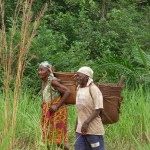
The forest is their pharmacy. Photo: M. Sayagues
Last year, when he was scratching madly with chickenpox, his granny’s ointment of coconut oil and leaves relieved the itchiness.
When his friend Geane Castro feels a cold coming, his grandmother makes him a hot bath with water infused with leaves and bark, then a special tea with plants she gathers in the forest. Presto, he recovers.
I meet them at Teia D’Arte, an art gallery in Sao Tome, the capital of the tiny two-island nation of Sao Tome and Principe, off the coast of Gabon.
With a rich biodiversity of 600 botanical species and 132 endemic plants, the islands’ rainforest is a well-stocked pharmacy for herbalists.
Their knowledge is captured in a decade-long ethno-pharmacological study published last year. Researchers worked with 40 traditional healers, midwives and grandmothers to identify and classify 325 medicinal plants, note 1,000 recipes and test 25 plants in the lab. Many look promising for developing new medicines. (more…)
53 Comments
Runner Caster Semenya: gender, sex and discrimination
Posted on August 26, 2009, by mercedes, under Gender Masala, adolescents, culture, health, human rights, media, stereotypes, women, men and more.
Open letter by South African gender activists

Courtesy of Zapiro, Mail & Guardian
Some of those championing Caster Semenya’s cause accuse those wanting to sex-test Caster of imperialism and racism (as well as sexism). Others plead to wait before reaching a verdict, arguing that the realities of sex testing are enormously complex
Firstly to address the issue of terminology, over which there seems to be confusion. Gender is the dominant society’s views on how women and men should look, behave, what roles they should play in society, how they should perform and frequently what rewards they receive – hence gender inequity. This has usually led to lower status and discrimination against girls/women but has increasingly been seen as limiting the options and potentially harming boys/men too.
Gender is not a politically correct term for sex. Sex testing would be just that - establishing whether a person is biologically female or male. So gender testing is not the term that should be used this case, but sex testing. (more…)
108 Comments
Whose pleasure? Notes about male circumcision and female sexuality
Posted on August 24, 2009, by mercedes, under Gender Masala, HIV/AIDS, culture, health, media, women, men and more.
Guest blogger: Pierre Brouard, Deputy Director, Centre for the Study of Aids, University of Pretoria, South Africa
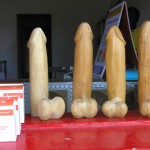
Hard task: defining sexual pleasure. Photo: M. Sayagues
So what headlines have grabbed you lately about male circumcision in South Africa? These caught my eye:
“The death toll in the Eastern Cape’s winter circumcision season has risen to 31”
“Circumcision ’scam’ probed”
“Two on run after initiate dies”
As alarming and distressing as these headlines are – and the sad, desperate and greedy subtexts embedded in them – they don’t say much about the other big debate that is raging across southern Africa: the value of male circumcision to prevent HIV acquisition in heterosexual men, and what’s in it for women. (more…)
95 Comments
Getting the UN into GEAR!
Posted on August 17, 2009, by mercedes, under Gender Masala, human rights, media, politics, women, men and more.
By Sharon Bhagwan Rolls, founding coordinator, femLINKPACIFIC
Contributing blogger
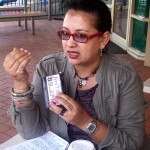
Sharon Bhagwan Rolls
Getting into GEAR! What does this really mean in a Pacific Island state, surrounded by an ocean rising rather too quickly, that some of us are thinking about getting into gear before it becomes a sink or swim situation?
Does it mean we switch from paddling our own canoes at the pace known as “Pacific time” to powering our way into the future with the assistance of fuel guzzling outboard engines?
And as we rapidly negotiate our way through the waters, will we be protected by life jackets should there be any mishaps along the way?
5,325 Comments
Taboo word out in the open
Posted on July 27, 2009, by mercedes, under Gender Masala, adolescents, culture, human rights, women, men and more.
Sometime in this century, a taboo word crept out of the dark, dusty basement of journalists’ lexicon and acquired legitimacy and visibility, both as a word and an issue: menstruation.

Now we can talk about it.
Neither impurity necessitating reclusion nor social blunder, our monthly cycle is now recognized as part of women’s sexual and reproductive needs and an issue of hygiene and dignity.
(…and I wrote “our cycle” on the third edit, it´s still not that easy to be public about it…)
Something similar happened with cancer. As philosopher Susan Sontag noted in her classic essay “Illness as a Metaphor” of 1977, the standard euphemism used in obits was that someone had died after a long illness. Ten years later, she noted “a new candor”, the word cancer uttered more freely.
Regarding menstruation, surprisingly, TV ads did not shy away from comparing pad brands. But the press lagged behind the ad agencies.
119 Comments
Fake watches, artificial limbs and real needs
Posted on July 20, 2009, by mercedes, under Gender Masala, human rights, media, violence, women, men and more.
Ads about diamond-and-sapphire studded watches don’t turn me on. But this one gripped me. 
A screw-on hand and the slogan: “Fake watches are for fake people. Be authentic. Buy real.”
The ad is part of a campaign against counterfeiting launched by the Geneva-based Fondation de la Haute Horlogerie last month.
I might have ignored it but the day I saw it in a magazine, I had been interviewing amputees and photographing artificial limbs, not unlike the hand in the ad, for a story.
131 Comments
Can u Talk? Cellphones and Girls in South Africa
Posted on July 6, 2009, by mercedes, under Gender Masala, culture, media, violence, women, men and more.
Guest posting
by Sally-Jean Shackleton, Executive Director, Women’s Net
 There has been phenomenal growth in the cellphone industry in Africa. It is clear this technology is essential in a continent with failing land line telephony infrastructure and development.
There has been phenomenal growth in the cellphone industry in Africa. It is clear this technology is essential in a continent with failing land line telephony infrastructure and development.
The opportunities for development that have resulted from this growth is clear. Cellphones are used to communicate HIV information, send market prices to rural small farmers and to collect data in rural health care. (more…)
867 Comments
Women, justice and memory
Posted on June 29, 2009, by mercedes, under Gender Masala, arts, human rights, media, truth commissions, violence, war rape.
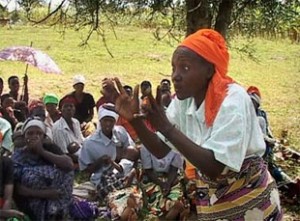
Remembering in Rwanda. Courtesy Anne Aghion
What happens when the relatives of the murdered confront their murderers? What happens if they have to live with the murderers?
This is the theme of “My neighbour, my killer”, a film about Rwanda’s extraordinary attempt at reconciliation. This documentary by Anne Aghion, which premiered in New York two weeks ago at the Human Rights Watch film festival, follows a gacaca or community court during five years.
Rwanda has set up some 12, 000 gacaca where killers face the relatives of those they killed during the genocide in 1994. (Read an interview with Aghion here).
25 Comments
In the dark alleys of the internet
Posted on June 7, 2009, by mercedes, under Gender Masala.
 Do you erase your browser history after using a public computer? It’s pretty much like using a condom in casual sex, or avoiding dark alleys: extra security, lowering your risk.
Do you erase your browser history after using a public computer? It’s pretty much like using a condom in casual sex, or avoiding dark alleys: extra security, lowering your risk.
Leaving your cybertracks for strangers to follow is not a good idea. Or for those closer to home. In fact, at home. Say, an abused woman calls a hotline late at night. The following day, her husband discovers the link in her browser history and beats her up. (more…)

